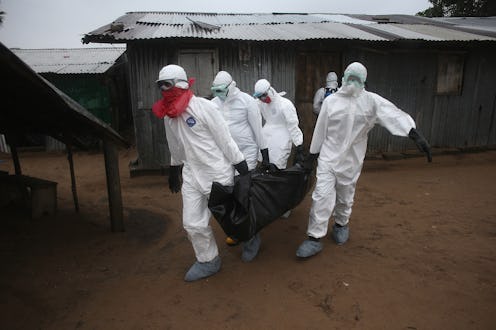News
Ebola Is Now In The U.K.
The Ebola outbreak that began in West Africa has now made its way into yet another continent. On Sunday, the first British Ebola patient was flown out of Sierra Leone and will return home for treatment in the Royal Free Hospital in London.
The patient, whose identity remains undisclosed, is said to be in stable condition, and Reuters reports that the British Department of Health has said that the Briton is "not currently seriously unwell." Even so, all precautions are being taken with both his transport back to the UK as well as his treatment — the patient is currently aboard a "specially adapted Royal Air Force cargo plane," and will be treated in a "high-level isolation unit."
Britain's Deputy Chief Medical Officer John Watson told Sky News,
We understand that this patient, during the course of the work that he was carrying out, was exposed about a week ago and became unwell two or three days ago.
The British government has stressed to its citizens that the risk of outbreak is "very low," and the Department of Health released a statement in which they assured the public, "The UK has well-established and practised infection control procedures for dealing with cases of imported infectious disease."
This is clearly exemplified by their state-of-the-art tent system at the Royal Free. The tent, which is housed inside a normal hospital room, is made of plastic and rubber, and ensures that healthcare providers are separated at all times from the patient, but are still able to interact normally with built-in gloves and masks.
The tent also comes with its very own ventilation unit, which purifies the air before sending it out into the rest of the room. Even though the virus is not airborne, and rather is only spread through bodily fluids, healthcare experts are taking no chances.
This represents the first confirmed case of a British Ebola patient, though the World Health Organization estimates that there have been a total of 2,615 in West Africa since the outbreak began months ago. The Department of Health said that they chose to bring the patient back to the UK following "clinical advice."
Due to strained resources in Sierra Leone and throughout West Africa, many agreed that it was best for the Briton to be treated at home. While some efforts have been made to transport other West African patients to better equipped facilities, BBC reports that many locals are unwilling to allow their relatives to be taken away from them given the high mortality rate of the disease.
British Airways decided to stop flying passengers to and from Liberia and Sierra Leone beginning on August 5, and the ban will remain in place until the end of the month.
As if this weren't bad enough, Ebola has also begun to spread more virulently through the Democratic Republic of the Congo. Health Minister Felix Kabange Numbi told Reuters that yet another outbreak of the disease had been confirmed in a northern province.
Even more concerning is the report that this particular strain of the virus is a different one from that plaguing the rest of West Africa. Said Numbi at a news conference, "This epidemic has absolutely no link with what is happening in West Africa."
Thus far, there have been two reported deaths as a result of Ebola.
In yet another report, the WHO revealed that the first WHO worker has tested positive for Ebola. The worker was stationed in Sierra Leone, and is said to be an expert from Senegal.
While there remains no official cure for the disease, American patients Dr. Kent Brantly and Nancy Writebol both made full recoveries after being given the experimental drug called ZMapp. The treatment has also been given to three members of the medical staff in Liberia, who have also been said to show signs of improvement.
The drug, however, remains very much in an experimental stage, and according to the Center for Disease Control's website, "the manufacturer reports that there is a very limited supply."
The CDC also notes that no previous Ebola outbreak have been controlled by drug therapies — rather, isolation, education, and infection control were cited as the key ingredients of an effective solution.
Thus far, however, this seems nearly impossible. Healthcare facilities in West Africa are entirely overrun, and distrustful locals who have never heard of Ebola are suspicious that the disease is nothing but a myth invented by local governments.
But with the growing presence of the disease throughout different parts of the continent, it seems that the reality of Ebola will soon be undeniable.
Images: Getty (4)
